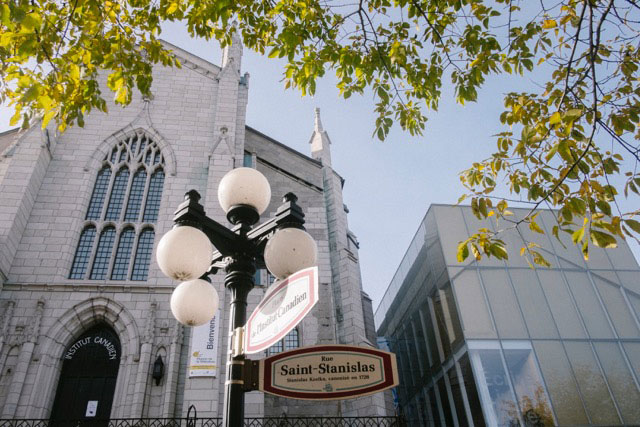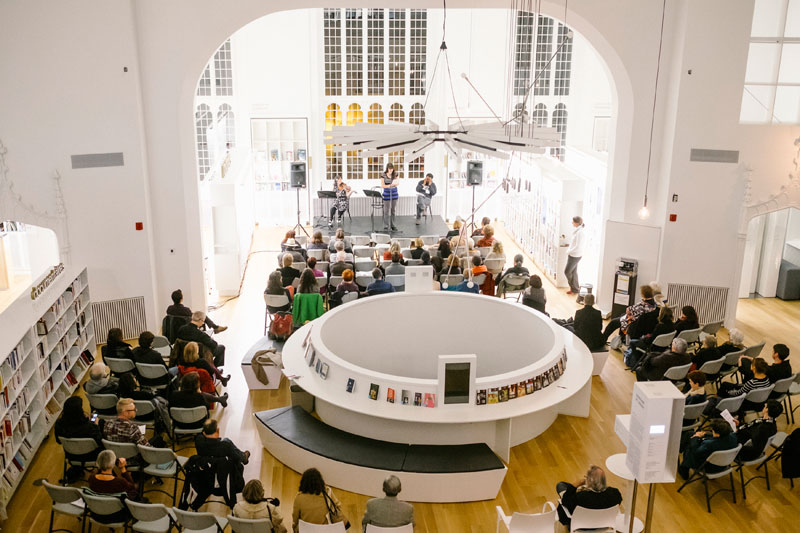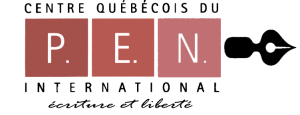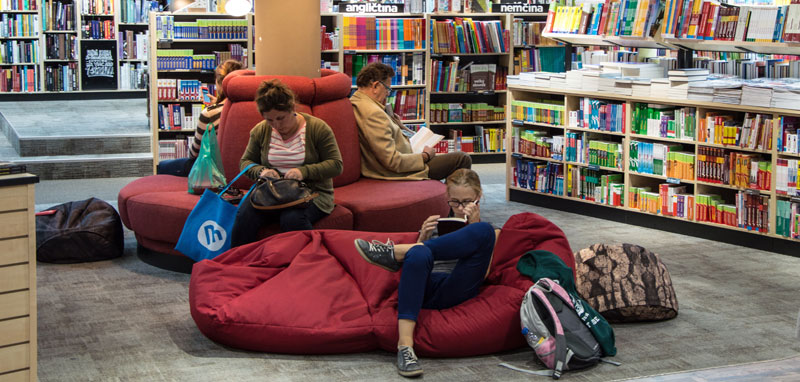COMPARATIVE APPROACH : QUEBEC
IN THE FRENCH-SPEAKING COMMUNITIES, QUEBEC HAS WITHIN ITS TERRITORY, OTHER THAN THE MAJOR CITIES (QUEBEC, MONTREAL, ETC.) MANY RESIDENTIAL SITES IN THE REGION (LAURENTIDES, OUTAOUAIS, NUNAVIK, ETC.). THE CULTURAL POLITICS OF QUEBEC, PARTICULARLY THROUGH THE CREATION IN 1994 OF THE COUNCIL OF ARTS AND LETTERS, HAS FOSTERED THE DEVELOPMENT OF THE RESIDENCES, AT THE LOCAL, BUT ALSO INTERNATIONAL LEVEL THROUGH MANY PARTNERSHIPS (ARGENTINA, BELGIUM, FRANCE, HAITI, JAPAN, MEXICO, FOR EXAMPLE) TO IMPLEMENT CROSSED RESIDENTIAL DEVICES, TO FOCUS ON THE CREATION AND LITERARY EXPERIMENTATION IN RELATION TO POPULATIONS.
FROM A TYPOLOGY OF HOUSES UNDER CONSTRUCTION, THE GOAL HERE IS TO FOCUS ON A SELECTION OF RESIDENTIAL SITES IN ORDER TO CAPTURE THEIR DIVERSITY.
QUEBEC CITY

Quebec : La Maison de la literature
The Maison de la literature is an innovative place founded on the pursuit of offering to coach authors, the book trade and the public; a space for the pooling of resources, by participating in the renewal of the territorial network, through the support of the literary initiative (creation and experimentation).
Built from a heritage building, abandoned in the District of old Quebec (the former Wesley temple), the House depends on a prestigious literary institution (Institute of Québec), a private non-profit cultural organization founded in 1848, administering the library network in Quebec and having as objectives: “to enrich the life of the citizens and make Quebec City a creative literary city that radiates throughout Quebec, in the French speaking countries, and the world. “To promote and make knowledge and culture accessible by providing library services, mediation, and cultural and literary dissemination (www.institutcanadien.qc.ca)”. In this project, initiated in 2007, the city and the Ministry of Culture pledged to reposition the writers at the heart of the urban world with the creation of this place that is particularly relevant insofar as it seeks to connect:
- the various fields of literature, both the creation (“authors’ residences, writing firms, design studios, workshops of comics and illustration, etc.”)
- broadcasting (“public libraries, reading rooms, web spaces, exhibitions and offices for literary organizations”)
- cultural mediation (“literary bistros, literary performances, shows, meetings with authors”)
- not forgetting training (“young literary successors can meet their mentor, get support and training, and present the results of their work to the public”)
THE HOUSE OFFERS SEVERAL RESIDENTIAL PROGRAMS IN QUEBEC.



CROSS-RESIDENCES: INTERNATIONAL OPENING
Residence for writing Quebec-Paris
As part of a cooperation agreement between the cities of Quebec and Paris to develop initiatives allowing the expression of the writers of the two cities, as well as the promotion of Francophone literature from the public, this cross-residence was born. Each year, for a stay of 3 months, around a writing project (novel, short story, literary essay, poetry, story, dramatic writing), a Parisian author is received in Quebec and a Quebec author is welcomed in residence in the workshops of the city of Paris, Cité internationale des Arts
Within this framework for example, the writer Fabienne Jacob, born in Lorraine, was received in Quebec City in 2011.

Quebec-Bordeaux Creative Residency
In 2007, as part of the cooperation between Aquitaine and the province of Quebec, the Cultural Agency of the regional Council, Ecla (Written cinema and Audiovisual books in Aquitaine) and the Canadian Institute of Quebec, the administrator of public libraries, teamed up to establish a residential exchange for a period of two months each year. The originality of this cross-residence focuses on literary alternation, because the odd-numbered years are dedicated to comics and even years to children’s literature. The resident author is invited to participate in several professional and/or public meetings (in bookstores, libraries, comic strip festivals, book fairs or school settings).
In this context, for example the cartoonist, Laureline Mattiussi, born in Lorraine, was received in Quebec in 2009.

RESIDENCE OF WRITERS IN COLLABORATION WITH THE QUEBEC INTERNATIONAL CENTRE OF P.E.N.
Since 2006, in collaboration with the Quebec Centre of P.E.N. and Quebec City, the writers in exile in Canada, receive a three month residency at the House of literature. The acronym “P.E.N.” refers to the English word “pen”, whose three letters also represent the words poets, essayists, novelists (poets, essayists, short story writers – novelists). It is a body of writers (poets, novelists, essayists, dramatic, critical writers, translators, journalists) founded in London (1921) which promotes the importance of literature and defending freedom of expression worldwide through more than 100 countries:
“literature regardless of national origin, knows no boundaries and should remain a common value to nations despite political and international changes.”
This residence is built around a double objective:
• to help writers in exile to return to their practice and their professional activities in Canada.
• to help the writers concerned about freedom of expression in their work related to this issue. The residence permits to establish partnerships with educational institutions, libraries and the literary community of the host city.
penquebec.org/pen-international
In this context, for example the author and Algerian journalist Aziz Farès was received in Quebec City in 2015.


RESIDENCE FOR YOUNG QUEBEC
Under this heading, it is possible to discover an innovative project of creativity and citizenship, a residence dedicated to emerging writers in order to get support for the achievement of a creative project, to support Quebec’s emerging artists. This residence constitutes an appropriate tool within the framework of the cultural policy conducted through the program Première Ovation (First Ovation, a springboard for young artists).
“Implemented in 2008 by Quebec City, the measure Première Ovation aims at supporting the artistic beginnings of young talents by enabling them to create and experience their first professional experiences. At the occasion of the Québec horizon culture, in 2009, the Ministry of Culture and Communications partnered with Quebec City in order to support Première Ovation through the Cultural Development Agreement. This opportunity permitted to add new disciplines to music and theatre, that is to say dance, literary arts, visual arts, media arts as well as crafts. In 2012, Première Ovation added multi-arts and, in 2015, it added circus and heritage.”
The objective is to facilitate the insertion of a literary heritage in the professional arena, while giving a certain visibility to writers. This housing assistance applies to young writers (between 18 and 35 years old) who live within the boundaries of Quebec City and takes two forms within the Literature House :
• a classic writing residency
• a residency for literary arts creation (production of artistic contents other than books) which takes place inside the residence in the studio of creation of the House of Literature – literary shows, performances, video poems, radio dramas, stage or web adaptations, comics improvisations, installations, presentations in public spaces, multimedia experiments, etc.).
Within this framework, the playwright Valérie Boutin for example, obtained a writing residency in 2015.

THE CITY OF MONTREAL


IN-RESIDENCE WRITERS AT THE HEART OF URBAN AREAS
Theatres, universities but also libraries, bookshops, schools, neighbourhoods, Montreal’s writers’ residence is bustling within public spaces and provides its inhabitants with the incentive for literary creation. It also enjoys various programs established by Montreal’s Council of the Arts such as “Writers in Residence” created in 2007 in order to enable writers to meet their audience by putting in place a literary project in cooperation with people from the community while pursuing their own creative work. The aim is to foster the diversity of the forms of literary expression as well as the forms of participation in cultural life in interaction with numerous institutions of the city.
RESIDENCIES IN LIBRARIES
artsmontreal.org/fr/programmes/ecrivains-en-residence
https://www.uneq.qc.ca
http://www.banq.qc.ca/activites
This residential device carried out with the help of Montreal’s Arts Council (CAM), Montreal’s Library Directorate and the Québec Union of Writers (UNEQ) is aimed at writers living on the island of Montréal. The authors retained for several months in various district libraries must perform a creative work and a cultural mediation project addressed to the population of the boroughs concerned. Writers are not intended to enliven the area, they must occupy it, or inhabit it in an ad hoc manner while producing a work (creative project) inspired by on-site meetings (mediation project with visitors). The idea is to value contemporary literature through the creation of a writer residency inside the library.
For instance, from September 2015 to June 2016, Montreal’s Grande Bibliothèque granted residency to the writer Gilbert Turp who decided to write “Journal intime de la Grande Bibliothèque” (the Grande Bibliothèque’s diary) combining literary experiments, portraits and diarist writing. A sort of “perpetual motion of self-writing, focused on the present”, according to Philippe Lejeune (“”Le journal comme “antifiction””, Poétique 1/2007 (n° 149), pp. 3-14 URL: cairn.info/revue-poetique),the diary is drafted “in progress” on the referential chronology line and relates this inner adventure’s route in digital format available online.
For Gilbert Turp, the residential interest lies in this possible interaction with the library, the taste for the unexpected, the encounters that can nourish the writer’s personal work, as he explains here:

RESIDENCIES IN BOOKSHOPS
Trying to go beyond the usual tension between commerce and culture, the Association des Libraires du Québec (ALQ) in partnership with the Arts Council of Montreal (CAM), through an experiment conducted as early as 2013 at the bookshop “Le Port de tête” sought to disseminate a residential model in this public space. Bookshops here are positioning themselves as “cultural mediators”. This system is based on the incentive to “familiarize the public with writers’works”, as outlined by Nathalie Maillé, the executive director of the Arts Council of Montreal: “Through this residency, we seek to promote meetings between creators and their readers, while also providing a stimulating place which will illuminate the talent of Montreal’s writers in different parts of the city. These meetings will foster discussions and will make the reality of the writing process known a bit more, which is very often done in solitude.”
Regarding the chosen cultural objectives, the aim is to promote contemporary authors, to demystify the process of literary creation, while showing the artisanal side of writing which feeds itself on multiple readings. Thus, every residency in a bookshop welcomes an author who will use a quote of a literary work (Invisible Cities by Italo Calvino, The Waves by Virginia Woolf) as the triggering element of his/her creation and mediation project.
In 2016 for instance, for 4 months (February-May) the writer Élise Desaulniers in residency at the “Zone libre” bookshop, proposed that residents of Habitations Jeanne-Mance become introduced to essay writing and opinion pieces through meetings and discussions in the bookshop. This project refers to the very function of this place and to the writer’s position at the heart of the city, as can be noted through the words of Mireille Frenette, the owner of the bookshop:
“Élise Desaulniers’ feminist vision and desire to give a say to Habitations Jeanne-Mance’s women, our neighbours, are in accordance with our repeatedly expressed will to become a place for exchange and for civic thoughts in our neighbourhood.”
RESIDENCIES IN SCHOOL
A program called “a Montreal school for all” gathers several institutions and organisms (Arts Council, Ministry of Education, Communication-Jeunesse) to promote the creation of writers’ residencies in Montreal schools. The central objective is to enable authors of children’s literature to carry out for several months a project of creation and cultural mediation developed on a theme chosen by the participating school. The purpose is also to familiarise the teachers and pupils with the creative writing process.
Within this framework, in January 2015, André Marois, an author of crime and science fiction in particular, benefited from a three-month residency at Montcalm primary school. This mission-like residency is articulated around a literary project with a memorial dimension aiming at encouraging children to collectively create a story linked to their territory (Villeray-St-Michel-Parc-Extension borough) over a definite period of time (the past 50 years) and in connection with testimonies inserted in the fiction. The presence of the crime fiction writer, thus, gives the opportunity to experiment with the relation between literature and reality, the treatment of unusual events or archive consultation as André Marois explains: “My residency is going on at Montcalm school. I started with the collection of information and documents– not always an easy task for the St-Michel neighbourhood – but I was able to visit the archives of St-Michel’s Journal and St-Michel’s library which also turned out to be a good source. Collecting testimonies and visiting generous witnesses delighted the pupils and enabled them to choose their story’s theme. They finished their plan today and will start redacting next week. We will therefore write 24 stories covering the past 50 years. The stories will be very diverse and interesting, some will be funny, some won’t. The pupils and I are very motivated. To be continued, once again”.

This residency form is similar to an “animation” residency or “a mission residency” often organised in order to promote artistic and cultural education to a specific public, based on extremely various forms of intervention and action and which doesn’t give authors enough time or very little time to conduct their writing work. The resident-authors must also sign up to an educational initiative designed to show and explain the creation processes they implement (reflection, experimentation, completion).

References :
Caron Jean-François (2008). « L’invitation au voyage : résidences pour auteurs et traducteurs à l’étranger ». Québec : Lettres québécoises, la revue de l’actualité littéraire, n° 130, p. 15-18.
Gilbert Bernard, 2016. « La Maison de la littérature de Québec et son programme de résidences ». In : BISENIUS-PENIN, Carole (dir.), Résidence d’auteurs, création littéraire et médiations culturelles. Vol. 2 : Territoires et publics. Nancy : PUN – Éditions Universitaires de Lorraine. p. 109-120.
Summary. – Inaugurated in October 2015, the Literary House occupies a heritage building located at the heart of Old Québec. After a major transformation, Quebec’s oldest library, which also housed a performance hall, became an innovative device dedicated to literature. In an area of 2,500 m2, we can find a public library and a permanent exhibition devoted to Quebec literature, a literary stage, a writer’s residence and creative spaces (studio, comics workshop, offices). Each year, programming includes several hundred activities, including the festival Quebec en Toutes Lettres. The Literary House offers a diverse programme of residencies, which are reserved for writing as well as for literary arts creation. These resedencies, in addition to the literary stage and the festival, give literary communities from Quebec and elsewhere frequent opportunities of creation, production and public broadcasting.
Grognet Hélène, 2002. « Les bibliothèques, les écrivains et leurs publics ». Lyon : Bulletin des bibliothèques de France (BBF), n° 6, p. 29-34. Disponible en ligne : bbf.enssib.fr
Le Marec Joëlle, 2006. « Les musées et bibliothèques comme espaces culturels de formation », Savoirs 2 (n° 11), p. 9-38. Disponible en ligne :
URL : cairn.info/revue-savoirs
Poissenot Claude, 2011. « Publics des animations et images des bibliothèques ». Bulletin des bibliothèques de France (BBF), n° 5, p. 87-92. Disponible en ligne : bbf.enssib.fr/consulter/
Tabah Dominique, 1997. « Le rôle social et culturel des bibliothèques vu de Bobigny ». Bulletin des bibliothèques de France (BBF), n° 1, p. 41-50. Disponible en ligne : bbf.enssib.fr
Thorel Christian, 2013. « Libraires, médiations et compétences ». Bulletin des bibliothèques de France (BBF), n° 3, p. 12-17. Disponible en ligne :
bbf.enssib.fr/consulter/bbf
Sarrazin Sylvain (2011). « Résidents impermanents ». Québec : Entre les lignes : le plaisir de lire au Québec, vol. 8, n° 1, p. 25.
erudit.org/culture


